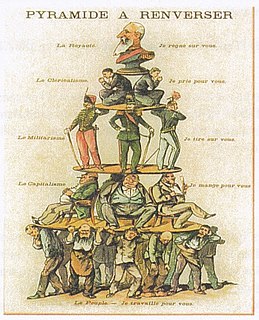Historicism is an approach to explaining the existence of phenomena, especially social and cultural practices, by studying their history, that is, by studying the process by which they came about. The term is widely used in philosophy, anthropology, and sociology.

Nature versus nurture is a long-standing debate in biology and society about the balance between two competing factors which determine fate: genetics (nature) and environment (nurture). The alliterative expression "nature and nurture" in English has been in use since at least the Elizabethan period and goes back to medieval French.

Determinism is a philosophical view, where all events are determined completely by previously existing causes. Deterministic theories throughout the history of philosophy have developed from diverse and sometimes overlapping motives and considerations. The opposite of determinism is some kind of indeterminism or randomness. Determinism is often contrasted with free will, although some philosophers claim that the two are compatible.

Environmental determinism is the study of how the physical environment predisposes societies and states towards particular development trajectories. Jared Diamond, Jeffrey Herbst, Ian Morris, and other social scientists sparked a revival of the theory during the late twentieth and early twenty-first centuries. This "neo-environmental determinism" school of thought examines how geographic and ecological forces influence state-building, economic development, and institutions. Many scholars underscore that this original approach was used to encourage colonialism and eurocentrism, and devalued human agency in non-Western societies, whereas modern figures like Diamond have instead used the approach as an explanation that rejects racism.

In the 19th century, the philosophers of the 18th-century Enlightenment began to have a dramatic effect on subsequent developments in philosophy. In particular, the works of Immanuel Kant gave rise to a new generation of German philosophers and began to see wider recognition internationally. Also, in a reaction to the Enlightenment, a movement called Romanticism began to develop towards the end of the 18th century. Key ideas that sparked changes in philosophy were the fast progress of science, including evolution, most notably postulated by Charles Darwin and Jean-Baptiste Lamarck, and theories regarding what is today called emergent order, such as the free market of Adam Smith within nation states, or the Marxist approach concerning class warfare between the ruling class and the working class developed by Karl Marx and Friedrich Engels. Pressures for egalitarianism, and more rapid change culminated in a period of revolution and turbulence that would see philosophy change as well.

Environmental sociology is the study of interactions between societies and their natural environment. The field emphasizes the social factors that influence environmental resource management and cause environmental issues, the processes by which these environmental problems are socially constructed and define as social issues, and societal responses to these problems.

In the social sciences, social structure is the aggregate of patterned social arrangements in society that are both emergent from and determinant of the actions of individuals. Likewise, society is believed to be grouped into structurally related groups or sets of roles, with different functions, meanings, or purposes. Examples of social structure include family, religion, law, economy, and class. It contrasts with "social system", which refers to the parent structure in which these various structures are embedded. Thus, social structures significantly influence larger systems, such as economic systems, legal systems, political systems, cultural systems, etc. Social structure can also be said to be the framework upon which a society is established. It determines the norms and patterns of relations between the various institutions of the society.
Theories of technological change and innovation attempt to explain the factors that shape technological innovation as well as the impact of technology on society and culture. Some of the most contemporary theories of technological change reject two of the previous views: the linear model of technological innovation and other, the technological determinism. To challenge the linear model, some of today's theories of technological change and innovation point to the history of technology, where they find evidence that technological innovation often gives rise to new scientific fields, and emphasizes the important role that social networks and cultural values play in creating and shaping technological artifacts. To challenge the so-called "technological determinism", today's theories of technological change emphasize the scope of the need of technical choice, which they find to be greater than most laypeople can realize; as scientists in philosophy of science, and further science and technology often like to say about this "It could have been different." For this reason, theorists who take these positions often argue that a greater public involvement in technological decision-making is desired.

Economic determinism is a socioeconomic theory that economic relationships are the foundation upon which all other societal and political arrangements in society are based. The theory stresses that societies are divided into competing economic classes whose relative political power is determined by the nature of the economic system.
Hereditarianism is the doctrine or school of thought that heredity plays a significant role in determining human nature and character traits, such as intelligence and personality. Hereditarians believe in the power of genetics to explain human character traits and solve human social and political problems. Hereditarians adopt the view that an understanding of human evolution can extend the understanding of human nature.

The sociology of culture, and the related cultural sociology, concerns the systematic analysis of culture, usually understood as the ensemble of symbolic codes used by a member of a society, as it is manifested in the society. For Georg Simmel, culture referred to "the cultivation of individuals through the agency of external forms which have been objectified in the course of history". Culture in the sociological field is analyzed as the ways of thinking and describing, acting, and the material objects that together shape a group of people's way of life.
Reciprocal determinism is the theory set forth by psychologist Albert Bandura which states that a person's behavior both influences and is influenced by personal factors and the social environment. Bandura accepts the possibility that an individual's behavior may be conditioned through the use of consequences. At the same time he asserts that a person's behavior can impact the environment.
Freedom and Culture is a book by John Dewey. Published in 1939, the book is an analytical defense of democracy written in a time when democratic regimes had recently been replaced by non-democratic ones, and at a time when Marxism was considered a powerful political force.

Culture change is a term used in public policy making that emphasizes the influence of cultural capital on individual and community behavior. It has been sometimes called repositioning of culture, which means the reconstruction of the cultural concept of a society. It places stress on the social and cultural capital determinants of decision making and the manner in which these interact with other factors like the availability of information or the financial incentives facing individuals to drive behavior.
Cultural materialism is an anthropological research orientation first introduced by Marvin Harris in his 1968 book The Rise of Anthropological Theory, as a theoretical paradigm and research strategy. It is said to be the most enduring achievement of that work. Harris subsequently developed a full elaboration and defense of the paradigm in his 1979 book Cultural Materialism. To Harris social change is dependent of three factors: a society's infrastructure, structure, and superstructure.

In Marxist theory, society consists of two parts: the base and superstructure. The base refers to the mode of production which includes the forces and relations of production into which people enter to produce the necessities and amenities of life. The superstructure refers to society's other relationships and ideas not directly relating to production including its culture, institutions, political power structures, roles, rituals, religion, media, and state. The relation of the two parts is not strictly unidirectional. The superstructure can affect the base. However the influence of the base is predominant.
Social determinism is the theory that social interactions and constructs alone determine individual behavior.
Technological determinism is a reductionist theory that assumes that a society's technology progresses by following its own internal logic of efficiency, while determining the development of the social structure and cultural values; thus rendering technological progress a fundamentally anti-democratic force. The term is believed to have originated from Thorstein Veblen (1857–1929), an American sociologist and economist. The most radical technological determinist in the United States in the 20th century was most likely Clarence Ayres who was a follower of Thorstein Veblen and John Dewey. William Ogburn was also known for his radical technological determinism and his theory on cultural lag.

Marxism was introduced by Karl Marx. Most Marxist critics who were writing in what could chronologically be specified as the early period of Marxist literary criticism, subscribed to what has come to be called "vulgar Marxism." In this thinking of the structure of societies, literary texts are one register of the superstructure, which is determined by the economic base of any given society. Therefore, literary texts are a reflection of the economic base rather than "the social institutions from which they originate" for all social institutions, or more precisely human–social relationships, are in the final analysis determined by the economic base.
Several economic theories of the first half of the 19th century were influenced by Romanticism, most notably those developed by Adam Müller, Simonde de Sismondi, Johann Gottlieb Fichte and Thomas Carlyle. Michael Löwy and Robert Sayre first formulated their thesis about Romanticism as an anti-capitalist and anti-modernist worldview in a 1984 article called "Figures of Romantic Anti-capitalism". Romantic anti-capitalism was a wide spectrum of opposition to capitalism, ultimately tracing its roots back to the Romantic movement of the early 19th century, but acquiring a new impetus in the latter part of the 19th century.








